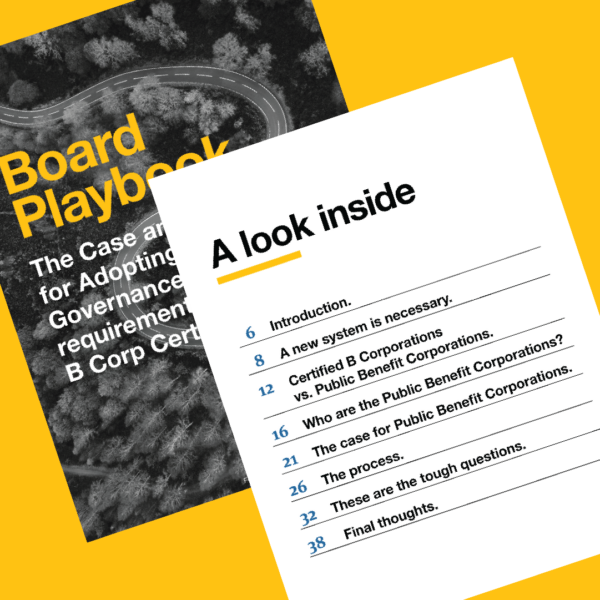Canada’s 21st Century Business Act Aims to Supplement Profit with Social and Environmental Impact
July 31, 2024
Canadian B Corps Among Advocates Calling for Stakeholder Governance Bill
The current economy’s prioritization of short-term profits puts the long-term future of people and the planet in escalating jeopardy. Businesses can play a key role in creating a better future by balancing financial returns with social and environmental impact in a stakeholder-centered economy.
Businesses also face growing expectations from policymakers and the public to operate in more sustainable and inclusive ways. In regions around the world, companies face new regulations for environmental, social, and governance (ESG) reporting that will hold them more accountable for their impact. Workers and customers increasingly consider a company’s social and environmental impact.
As forward-thinking businesses that are helping to reshape the global economy, Certified B Corporations, allied organizations, and advocates are calling for the broader adoption of stakeholder governance policy. Governments around the world are turning to stakeholder governance as a pathway toward greater business accountability, economic resilience, and positive impact.
The more recent step forward is progressing in Canada, where Independent Senator Julie Miville-Dechêne introduced the 21st Century Business Act (21BA) in May. The bill would amend the Canada Business Corporations Act to include a stakeholder governance framework for all federally incorporated businesses. Under the 21BA, corporate directors and officers would be required to consider the company’s social and environmental impacts in addition to profit-seeking objectives.

Canadian Senator Julie Miville-Dechêne
Eight countries and 38 states have adopted optional stakeholder governance frameworks, including benefit corporation legislation. If approved, the 21BA would make this the default model for Canadian corporations.
The bill reflects the global movement toward ESG sustainability and impact requirements. “Corporations must do their part because governments cannot be left alone to deal with the major social and environmental challenges of the 21st century,” Miville-Dechêne said. “Many businesses have already begun their transformation, but we must ensure that others join the movement and remain competitive in a world where sustainability is quickly — and correctly — emerging as a global norm, especially for younger generations.”

Examples and Resources to Demand an Economy for All
This free downloadable resource shares how B Lab U.S. & Canada and the B Corp community are building a stakeholder economy and driving collective political action to make the rules of the game more equitable and beneficial for all.
What Is the 21st Century Business Act?
The 21BA has three main components:
- Corporate purpose: The fiduciary duties of corporate directors and officers are linked to the purpose of the corporation, defined as the pursuit of its best interests, while also benefiting wider society and the environment in a manner proportionate to the size and nature of the corporation.
- Transparency: Corporations must publish annual reports documenting their social and environmental impacts, using established impact disclosure standards (such as the B Impact Assessment).
- Accountability: Actions can be brought against corporations that fail to live up to their obligations.
Bill Clark, an attorney involved in the initial work to propose the benefit corporation legal structure, said businesses have the choice to incorporate under provincial or federal law in Canada’s legal system. That means the 21BA would mandate stakeholder governance for all businesses that incorporate under federal law, requiring them to pursue financial success while benefiting wider society and the environment.
“The basic benefit that business provides for society is increasing material prosperity,” Clark said. “Business always has been good at promoting material prosperity. Along the way, however, they’ve also done a lot of things to make it a less good place to live. The 21BA and similar laws require businesses to reduce their external costs — that’s the biggest problem we need to solve.”
Jerome Lussier, who works with Miville-Dechêne, said the bill is a focused, realistic initiative that can pave the way for greater change. “You could have a bill that is much more far-reaching and all-encompassing,” he said. “We hope to make the bill and initiative well-known and discussed so that it is a political issue worth debating, in Canada and elsewhere.”
Business leaders and other advocates are working with Miville-Dechêne to raise awareness of the 21BA and its benefits — for society in general and all businesses — among elected officials. They are preparing for the legislative process in the fall, when the bill will move to its second reading in the Canadian Senate. “We are confident that support is high among the general public and believe there is also strong support in the business community,” Lussier said.
That belief is supported by research, including a 2022 survey that found 63% of Canadian business leaders agreed that “the purpose of a corporation should be to benefit all its stakeholders, including shareholders, employees, suppliers, the communities where it operates, and the environment.” In addition, a 2020 survey showed that 84% of Canadians believe that businesses should put the interests of other stakeholders on par with the interests of shareholders.

A New Way of Doing Business
To help business leaders navigate the journey to adopt benefit corporation status as a requirement of B Corp Certification, B Lab U.S. & Canada provides this downloadable resource, the Board Playbook, to lay out the process and demystify the risks.
B Corp Leaders Speaking Up for 21st Century Business Act
As a community of companies advocating for a stakeholder-driven economy, B Corps in Canada are among those advocating for the 21BA. They include Bernie Geiss, Founder and Co-Owner of B Corp Cove Advisors, an insurance broker in Vancouver, British Columbia.
Geiss said the 21BA is necessary to encourage companies to increase their commitment to good corporate citizenship. “The core is requiring a corporation or company to have a public benefit beyond just profit,” he said. “This says a company has to have a public benefit. It’s a starting point, and the first iteration of something that could be really great.”
Hari Balasubramanian of B Corp EcoAdvisors, an environmental consulting firm in Nova Scotia that helps leaders create positive environmental impact and generate economic value, said the 21BA can also broaden the view of success for Canadian businesses.
“The sooner businesses can expand their focus beyond short-term profit alone and make room for societal and environmental goals — which results in long-term value — they can truly appreciate the value of nature, resulting market opportunities, and the associated long-term benefits,” Balasubramanian said.
As mandatory, standardized sustainability reporting becomes the norm for corporations around the world in the coming years, the 21BA can help Canadian businesses integrate sustainability and better understand and manage the long-term financial risks and opportunities related to the climate crisis.
“When social and environmental considerations are taken into account, and when businesses communicate and live their values, they will attract and retain high-quality, values-aligned talent, minimize and manage downside risk, and be ready for sustainable opportunities to enhance value — as well as enhance their reputation and brand loyalty,” Balasubramanian said.
Learn more about the 21st Century Business Act and how to support the campaign
-

Stakeholder Economy
Resources to Help Businesses Support Civic Engagement for the 2024 U.S. Election
Read More -

-

-

Sign Up for our B The Change Newsletter
Read stories on the B Corp Movement and people using business as a force for good. The B The Change Newsletter is sent weekly.
